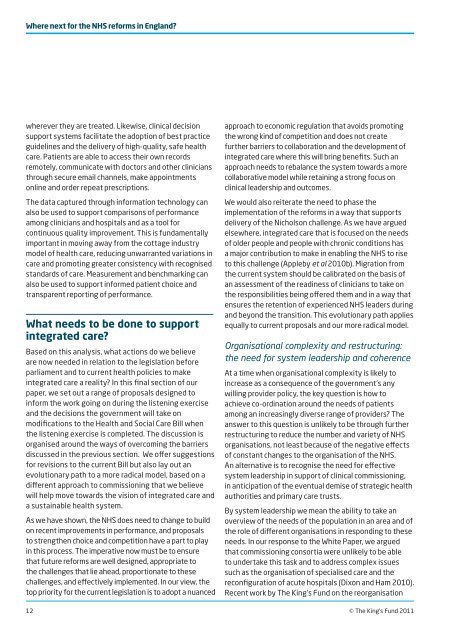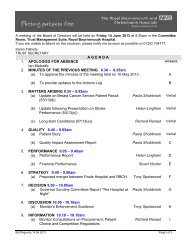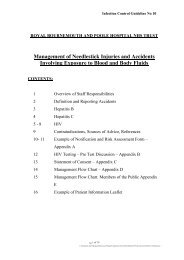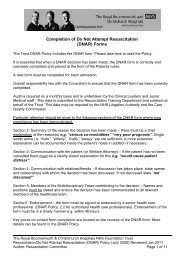View June's Board Pack - Royal Bournemouth Hospital
View June's Board Pack - Royal Bournemouth Hospital
View June's Board Pack - Royal Bournemouth Hospital
- No tags were found...
Create successful ePaper yourself
Turn your PDF publications into a flip-book with our unique Google optimized e-Paper software.
Where next for the NHS reforms in England?wherever they are treated. Likewise, clinical decisionsupport systems facilitate the adoption of best practiceguidelines and the delivery of high-quality, safe healthcare. Patients are able to access their own recordsremotely, communicate with doctors and other cliniciansthrough secure email channels, make appointmentsonline and order repeat prescriptions.The data captured through information technology canalso be used to support comparisons of performanceamong clinicians and hospitals and as a tool forcontinuous quality improvement. This is fundamentallyimportant in moving away from the cottage industrymodel of health care, reducing unwarranted variations incare and promoting greater consistency with recognisedstandards of care. Measurement and benchmarking canalso be used to support informed patient choice andtransparent reporting of performance.What needs to be done to supportintegrated care?Based on this analysis, what actions do we believeare now needed in relation to the legislation beforeparliament and to current health policies to makeintegrated care a reality? In this final section of ourpaper, we set out a range of proposals designed toinform the work going on during the listening exerciseand the decisions the government will take onmodifications to the Health and Social Care Bill whenthe listening exercise is completed. The discussion isorganised around the ways of overcoming the barriersdiscussed in the previous section. We offer suggestionsfor revisions to the current Bill but also lay out anevolutionary path to a more radical model, based on adifferent approach to commissioning that we believewill help move towards the vision of integrated care anda sustainable health system.As we have shown, the NHS does need to change to buildon recent improvements in performance, and proposalsto strengthen choice and competition have a part to playin this process. The imperative now must be to ensurethat future reforms are well designed, appropriate tothe challenges that lie ahead, proportionate to thesechallenges, and effectively implemented. In our view, thetop priority for the current legislation is to adopt a nuancedapproach to economic regulation that avoids promotingthe wrong kind of competition and does not createfurther barriers to collaboration and the development ofintegrated care where this will bring benefits. Such anapproach needs to rebalance the system towards a morecollaborative model while retaining a strong focus onclinical leadership and outcomes.We would also reiterate the need to phase theimplementation of the reforms in a way that supportsdelivery of the Nicholson challenge. As we have arguedelsewhere, integrated care that is focused on the needsof older people and people with chronic conditions hasa major contribution to make in enabling the NHS to riseto this challenge (Appleby et al 2010b). Migration fromthe current system should be calibrated on the basis ofan assessment of the readiness of clinicians to take onthe responsibilities being offered them and in a way thatensures the retention of experienced NHS leaders duringand beyond the transition. This evolutionary path appliesequally to current proposals and our more radical model.Organisational complexity and restructuring:the need for system leadership and coherenceAt a time when organisational complexity is likely toincrease as a consequence of the government’s anywilling provider policy, the key question is how toachieve co-ordination around the needs of patientsamong an increasingly diverse range of providers? Theanswer to this question is unlikely to be through furtherrestructuring to reduce the number and variety of NHSorganisations, not least because of the negative effectsof constant changes to the organisation of the NHS.An alternative is to recognise the need for effectivesystem leadership in support of clinical commissioning,in anticipation of the eventual demise of strategic healthauthorities and primary care trusts.By system leadership we mean the ability to take anoverview of the needs of the population in an area and ofthe role of different organisations in responding to theseneeds. In our response to the White Paper, we arguedthat commissioning consortia were unlikely to be ableto undertake this task and to address complex issuessuch as the organisation of specialised care and thereconfiguration of acute hospitals (Dixon and Ham 2010).Recent work by The King’s Fund on the reorganisation12 © The King’s Fund 2011
















